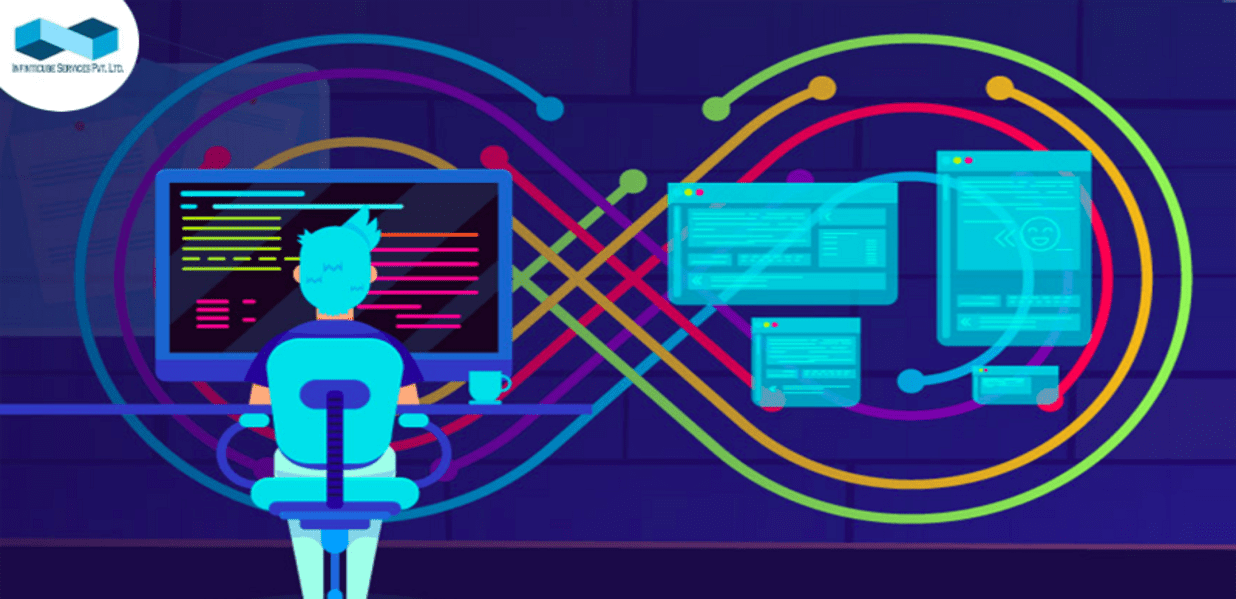How Favorable DevOps Environments affect DevOps Development Services?
In order to reduce costs and accelerate application development, top IT companies use DevOps. Rapid provisioning, scalable resources, and automated operations are essential for the development of DevOps technology. The problem is that complex distribution apps, including those for IoT devices, cannot be handled by traditional networking techniques.
In DevOps, software development processes are fully automated and streamlined. Many businesses use agile techniques such as Continuous Integration (CI) as part of their DevOps strategies. With CI, developers continuously verify their code in a shared repository. Due to the automated build process, DevOps Development Services providers can identify errors as soon as possible.
As part of our DevOps practices, Infiniticube automates processes, streamlines software development, and manages infrastructure. With our best practices, your organization will be able to deploy software more quickly and reliably.
However, only DevOps best practices can speed up the development, testing, and release of software applications. But, there is one question revolving in my mind. Do we need an environment that can deliver software frequently?
The answer is yes, we need an environment with appropriate resources for DevOps apps. Having a favorable environment for DevOps Development is also crucial for effective and impressive results when it comes to DevOps Development. Developers also need some sort of environment in order to be able to exert their best efforts. We will discuss further in the article the favorable DevOps environment and its effect as well.
Environment Complementing DevOps Development Services
Instruments for Test Management
Developers, testers, QA managers, and other essential project stakeholders are now a part of QA teams. A test management tool called Kualitee supports both DevOps and automation. Your DevOps process will be improved by its integration with DevOps tools like Jenkins, GitLab, Bitbucket, and others. Project development, deployment, and automation are all facilitated by Jenkins, the top open-source automation server.
Utilizing input-driven scripts in a Selenium-supported environment ensures error probability while minimizing the need for human intervention. In order to efficiently manage the execution of test cases, testing teams use these tools. Once they receive positive test results, they move on to the post-production stage.
The Right Ratio of Automation to DevOps
The majority of DevOps projects aim to automate as many manual tasks as they can. Deployment using the DevOps methodology is slowed down by a few issues, such as manual processes where the development team needs approval from a QA manager or executive.
These facts imply that there is a lack of collective team ownership over the results. The agile testing methodology states that each member of a cross-functional team shares equal responsibility for the quality of the software, which is in conflict with what is happening here. Continuous, frequent, and early testing are possible with the DevOps model.
Keep the team together as a whole
It's nearly impossible to avoid keeping the entire team informed throughout any development process. With DevOps, you can keep all stakeholders, the deployment team, and the operations team informed.
As a result, throughout the development process, communication within and between teams is streamlined. Every team member needs to be kept up to date in order to benefit from DevOps in communication. This increases transparency throughout the process by enabling everyone involved in the project to understand what other team members are doing.
Create an automated dashboard
DevOps can be fully utilized with the assistance of a computerized dashboard. The automated dashboard must be used because it is a centralized tool. It provides data to the operations team to help them make better decisions. A graphical representation on the dashboard clarifies and improves comprehension. As a result, business organizations can see the entire process from start to finish.
Don't rush developers
Organizations need to be aware that not every team member will adopt DevOps at the same time or in the same manner. Therefore, the business must provide developers with comprehensive training on the DevOps tool. Even though it's crucial to monitor their development closely, avoid pressuring them to pick up new skills too quickly. Some developers might not be familiar with the idea of DevOps. Be patient and give them time to experience- and time-based learning. Never forget that thorough training requires time.
Allow DevOps to have an impact on culture.
If business organizations want to see any changes, they must fully embrace DevOps. The perception that DevOps is too complex may hamper adoption. The best course of action in this circumstance would be to view DevOps as a cultural shift rather than a burden. If you consider it a burden, you won't be able to fully educate your developers. It is well known that there are departmental silos in the IT industry. DevOps, on the other hand, requires that the whole team work together as a cohesive unit.
Build flexible infrastructure
Processes for testing and developing applications should be flexible enough to handle many different exceptions. To manage infrastructure changes, there are numerous configuration management tools available. Failure infrastructure modes, if any, are continuously tested to ensure consistency. During testing, if a problematic component is found, it is automatically scheduled for analysis. The performance of other components is unaffected by this background analysis, which has no impact on it.
Conclusion
QA testing is a crucial part of a DevOps pipeline because the DevOps methodology is used to guarantee both speed and quality. With the aid of the proper test management tool, agile teams can cooperate in a variety of testing areas, including automation testing and providing the infrastructure to support automation for deployment.
Modern QA teams can also integrate with other tools that offer project management, issue tracking, and automated tools in order to support DevOps and agile environments. Thanks to test management tools, modern businesses can keep up with DevOps and automation demands, ensuring quick and reliable software delivery.
When properly applied, the powerful tool of DevOps can be very advantageous to businesses. The possibilities for your business are endless if the DevOps Development Services providers have the knowledge and expertise to implement the best DevOps Environment. DevOps is a fantastic tool that can enhance your application's delivery process at every stage, from design to deployment.
Infiniticube Services is an innovative, creative, and customer-centric IT company committed to helping you accomplish your goals through the use of technology to meet them. Using DevOps best practices with a suited environment, Infinitcube streamlines the software development process, automates process flows, and manages the infrastructure to deliver more stable, faster, and more dependable software.
It is also important that if you are considering hiring a top DevOps Development Company and want the most effective services to help you grow your business, then booking a call with our DevOps Experts is the first step.
 June 27, 2025
June 27, 2025
 Balbir Kumar Singh
Balbir Kumar Singh
 0
0
 June 13, 2025
June 13, 2025
 Balbir Kumar Singh
Balbir Kumar Singh
 0
0









Leave a Reply